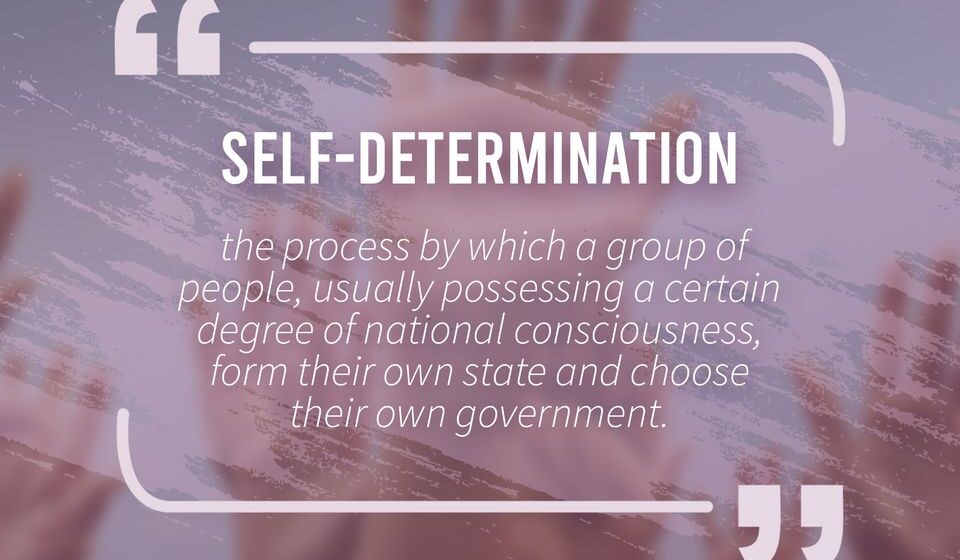The right to self-determination of peoples is presented as one of the purposes of the United Nations in Clause 1.2 of the UN Charter. This right was also confirmed by the United Nations General Assembly (GA) in the Declaration of Friendly Relations, which was unanimously adopted in 1970 and is considered an authoritative indication of customary international law. Article 1, common to the International Covenant on Economic, Social and Cultural Rights (ICESCR) and the International Covenant on Civil and Political Rights (ICCPR), reaffirms the right of all peoples to self-determination, and lays upon state parties the obligation to promote and to respect it.
By virtue of that right all peoples freely determine their political status and freely pursue their economic, social and cultural development.
The right of peoples to political self-determination, as it emerges from the UN documents, exists for peoples under colonial and alien domination, that is to say, who are not living under the legal form of a State. The right to secession from an existing State, Member of the United Nations, does not exist in the practice followed by the Organization, since to seek to invoke it in order to disrupt the national unity and the territorial integrity of a State would be a misapplication of the principle of self- determination contrary to the purposes of the United Nations Charter. (G. Espiel, The Right to Self-Determination, supra note 151, paragraph 90).
When it comes to economic, social and cultural self-determination, Article 27 of ICESCR states that those States in which ethnic, religious or linguistic minorities exist, persons belonging to such minorities shall not be denied the right, in community with the other members of their group, to enjoy their own culture, to profess and practise their own religion, or to use their own language. As we know, Armenians from Turkey, Iran and other places have been resettled in Nagorno-Karabakh after the sign of such documents as Gulustan (October 12, 1813) and Turkmenchai (February 10, 1828) treaties signed between Russian and Iran as well as Kurekchay treaty on May 14, 1805 signed between the Karabakh khan Ibrahim and the Russian empire on transfer of this khanate under Russia’s dominion. Thus, Armenians living in Nagorno-Karabakh are not members of a completely different ethnic group. They are members of Armenian nation and have been resettled in Nagorno-Karabakh as a result of political treaties signed between Azerbaijani khans and other states.
According to the last population census in 1989, the town of Shusha which was the political center of the Kharabakh Khanate had a population of 17,000 and Shusha district had a population of 23,000. 91.7% of population of Shusha district and 98% of Shusha town were Azerbaijani.
It is a well-recognized fact that Armenians living in Azerbaijan and Georgia, Azerbaijanis who lived in Armenia and are now living in Georgia, and Armenians and Georgians living in Azerbaijan are considered to be ethnic minorities who have the rights formulated in Article 27 of the Covenant on Civil and Political rights. The free interpretation of Article I of the Covenant on Civil and Political rights due to the self-determination of peoples with regard to the Armenian Population of Nagorno-Karabakh, as it is being interpreted and practiced by the Armenian side, is nothing more than the speculation on UN documents in order to justify military Occupation of Azerbaijani territory, inhabited by Armenians. Commenting on this UN practice, Professor Van Dyke (Human Rights, The United States, and the World Community 102, 1971) wrote that the UN “would be in an extremely difficult position if it were to interpret the right of self-determination in such a way as to invite or justify attacks on the territorial integrity of its own members. Armenia and Azerbaijan became members of the CSCE and the United Nations, Subject to International law, and thus are obliged to follow its principles.
Taking into consideration all the above-mentioned, Armenia violates the territorial integrity of Azerbaijan by breaching the principle of territorial integrity providing that countries should avoid promoting border changes or secessionist movements in other countries. Such actions are perceived as acts of aggression.
#ProDemos#ELSAAzerbaijan#AzerbaijaniBarAssociation#KarabakhisAzerbaijan#Karabakh#SelfDetermination#hüquq#qanun#dövlət#düşüncə#hüquqşünas


Leave a Reply